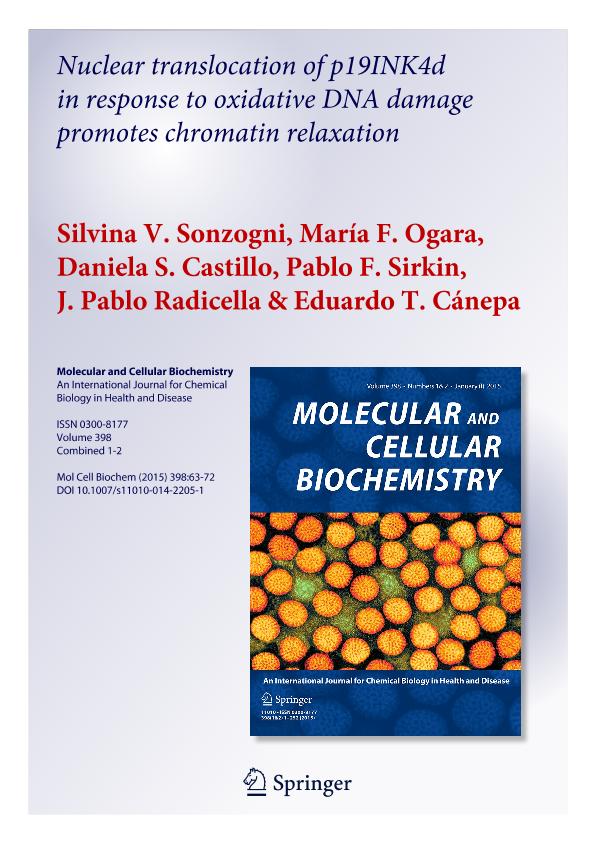Mostrar el registro sencillo del ítem
dc.contributor.author
Sonzogni, Silvina Veronica

dc.contributor.author
Ogara, Maria Florencia

dc.contributor.author
Castillo, Daniela Susana

dc.contributor.author
Sirkin, Pablo Federico

dc.contributor.author
Radicella, J. Pablo
dc.contributor.author
Canepa, Eduardo Tomas

dc.date.available
2017-07-11T20:37:49Z
dc.date.issued
2014-09
dc.identifier.citation
Sonzogni, Silvina Veronica; Ogara, Maria Florencia; Castillo, Daniela Susana; Sirkin, Pablo Federico; Radicella, J. Pablo; et al.; Nuclear translocation of p19INK4d in response to oxidative DNA damage promotes chromatin relaxation; Springer; Molecular and Cellular Biochemistry; 398; 1-2; 9-2014; 63-72
dc.identifier.issn
0300-8177
dc.identifier.uri
http://hdl.handle.net/11336/20170
dc.description.abstract
DNA is continuously exposed to damaging agents that can lead to changes in the genetic information with adverse consequences. Nonetheless, eukaryotic cells have mechanisms such as the DNA damage response (DDR) to prevent genomic instability. The DNA of eukaryotic cells is packaged into nucleosomes, which fold the genome into highly condensed chromatin, but relatively little is known about the role of chromatin accessibility in DNA repair. p19INK4d, a cyclin-dependent kinase inhibitor, plays an important role in cell cycle regulation and cellular DDR. Extensive data indicate that p19INK4d is a critical factor in the maintenance of genomic integrity and cell survival. p19INK4d is upregulated by various genotoxics, improving the repair efficiency for a variety of DNA lesions. The evidence of p19INK4d translocation into the nucleus and its low sequence specificity in its interaction with DNA prompted us to hypothesize that p19INK4d plays a role at an early stage of cellular DDR. In the present study, we demonstrate that upon oxidative DNA damage, p19INK4d strongly binds to and relaxes chromatin. Furthermore, in vitro accessibility assays show that DNA is more accessible to a restriction enzyme when a chromatinized plasmid is incubated in the presence of a protein extract with high levels of p19INK4d. Nuclear protein extracts from cells overexpressing p19INK4d are better able to repair a chromatinized and damaged plasmid. These observations support the notion that p19INK4d would act as a chromatin accessibility factor that allows the access of the repair machinery to the DNA damage site.
dc.format
application/pdf
dc.language.iso
eng
dc.publisher
Springer

dc.rights
info:eu-repo/semantics/openAccess
dc.rights.uri
https://creativecommons.org/licenses/by-nc-sa/2.5/ar/
dc.subject
Dna Damage Response
dc.subject
Chromatin Relaxation
dc.subject
P19ink4d
dc.subject
Genome Integrity
dc.subject.classification
Bioquímica y Biología Molecular

dc.subject.classification
Ciencias Biológicas

dc.subject.classification
CIENCIAS NATURALES Y EXACTAS

dc.title
Nuclear translocation of p19INK4d in response to oxidative DNA damage promotes chromatin relaxation
dc.type
info:eu-repo/semantics/article
dc.type
info:ar-repo/semantics/artículo
dc.type
info:eu-repo/semantics/publishedVersion
dc.date.updated
2017-07-11T19:27:03Z
dc.identifier.eissn
1573-4919
dc.journal.volume
398
dc.journal.number
1-2
dc.journal.pagination
63-72
dc.journal.pais
Estados Unidos

dc.description.fil
Fil: Sonzogni, Silvina Veronica. Universidad de Buenos Aires. Facultad de Ciencias Exactas y Naturales. Departamento de Química Biológica. Laboratorio de Biología Molecular; Argentina. Consejo Nacional de Investigaciones Científicas y Técnicas; Argentina
dc.description.fil
Fil: Ogara, Maria Florencia. Universidad de Buenos Aires. Facultad de Ciencias Exactas y Naturales. Departamento de Química Biológica. Laboratorio de Biología Molecular; Argentina. Consejo Nacional de Investigaciones Científicas y Técnicas; Argentina
dc.description.fil
Fil: Castillo, Daniela Susana. Universidad de Buenos Aires. Facultad de Ciencias Exactas y Naturales. Departamento de Química Biológica. Laboratorio de Biología Molecular; Argentina. Consejo Nacional de Investigaciones Científicas y Técnicas; Argentina
dc.description.fil
Fil: Sirkin, Pablo Federico. Universidad de Buenos Aires. Facultad de Ciencias Exactas y Naturales. Departamento de Química Biológica. Laboratorio de Biología Molecular; Argentina. Consejo Nacional de Investigaciones Científicas y Técnicas; Argentina
dc.description.fil
Fil: Radicella, J. Pablo. Université Paris Diderot - Paris 7; Francia
dc.description.fil
Fil: Canepa, Eduardo Tomas. Universidad de Buenos Aires. Facultad de Ciencias Exactas y Naturales. Departamento de Química Biológica. Laboratorio de Biología Molecular; Argentina. Consejo Nacional de Investigaciones Científicas y Técnicas; Argentina
dc.journal.title
Molecular and Cellular Biochemistry

dc.relation.alternativeid
info:eu-repo/semantics/altIdentifier/doi/http://dx.doi.org/10.1007/s11010-014-2205-1
dc.relation.alternativeid
info:eu-repo/semantics/altIdentifier/url/https://link.springer.com/article/10.1007%2Fs11010-014-2205-1
Archivos asociados
